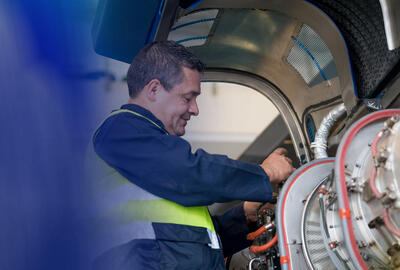<p>Landed an interview for a dream <a href="/jobs/q-aerospace-engineer/">aerospace engineering job</a>? Then review our list of top hints and tips on how to make the most of this opportunity.</p>
<p>Always note down clearly and double check interview times, dates and addresses, and always leave plenty of time on the day for the trip. Take contact numbers for interviewers and agencies and make sure to call if there is a problem on route. Dress smartly in a clean suit or office wear, complete with shiny shoes, nails and hair, and remain polite and calm at all times.</p>
<p>Do some homework on the interviewing company beforehand, making notes of a couple of relevant questions to ask as well as key news topics that you might get asked about yourself, and take along copies of CVs, covering letters or specific application forms that you have submitted to read over while you are waiting for your turn to be called.</p>
<h3>Further information for aerospace engineer job candidates.</h3>
<p>Aerospace engineers work across a variety of aerospace industries, but all employers will be looking for candidates offering a similar set of core skills. These skills will include excellent mathematics and IT skills, as well as a proven ability to problem solve and analyse a mass of data. Employees will also be expected to show good, relevant technical knowledge and experience with computer aided design or manufacturing software and efficient project management skills.</p>
<p>The role is a very responsible one, and interviewees should expect to be asked to demonstrate their calmness and logical thinking in the face of problems as well as excellent communication skills. Candidates should spend some time before any interviews thinking about how to illustrate the required skills, through either past employment situations or in academic studies where relevant.</p>
<h3>Aerospace engineer interview questions.</h3>
<ul>
<li>
<p>What do you see as a typical day in the life of an aerospace engineer?</p>
</li>
<li>
<p>Can you describe what you think are the most and least exciting aspects of an aerospace engineering career?</p>
</li>
<li>
<p>Can you explain when and why you first thought of a career in aerospace engineering?</p>
</li>
<li>
<p>What career-related qualifications do you hope to acquire over the next five years?</p>
</li>
<li>
<p>Are you looking to specialise in research and development, testing or production and maintenance?</p>
</li>
<li>
<p>Which modules in your engineering degree did you find most fascinating?</p>
</li>
</ul>
<h3>General interview questions.</h3>
<ul>
<li>Why are you looking to change jobs?</li>
<li>Why does a role with us specifically appeal to you?</li>
<li>What are your key development needs within your next role?</li>
<li>Where do you see yourself in five years’ time?</li>
<li>What level of salary would you be hoping for in this role?</li>
</ul>
<h3>Scenario interview questions.</h3>
<ul>
<li>Describe a previous employment situation in which you needed to think on your feet to solve an immediate problem.</li>
<li>Explain how you would deal with a disagreement between the client and yourself concerning a safety issue on a project.</li>
<li>What was the least successful project you have been involved in? What went wrong and what were your key take-aways from the project?</li>
</ul>
read more about careers in engineering.
see all articles-
 23 June 2023
23 June 2023highest paid engineering jobs.
-
14 October 2022
what does a civil engineer do?
-
 12 September 2022
12 September 2022Job interview tips: How to prepare
-
 20 January 2021
20 January 2021HS2 seeks STEM women returners to work.
-
 01 January 2021
01 January 2021CSCS cards lose grandfather rights.
-
 25 February 2020
25 February 2020my career in construction: interview with angela carney.